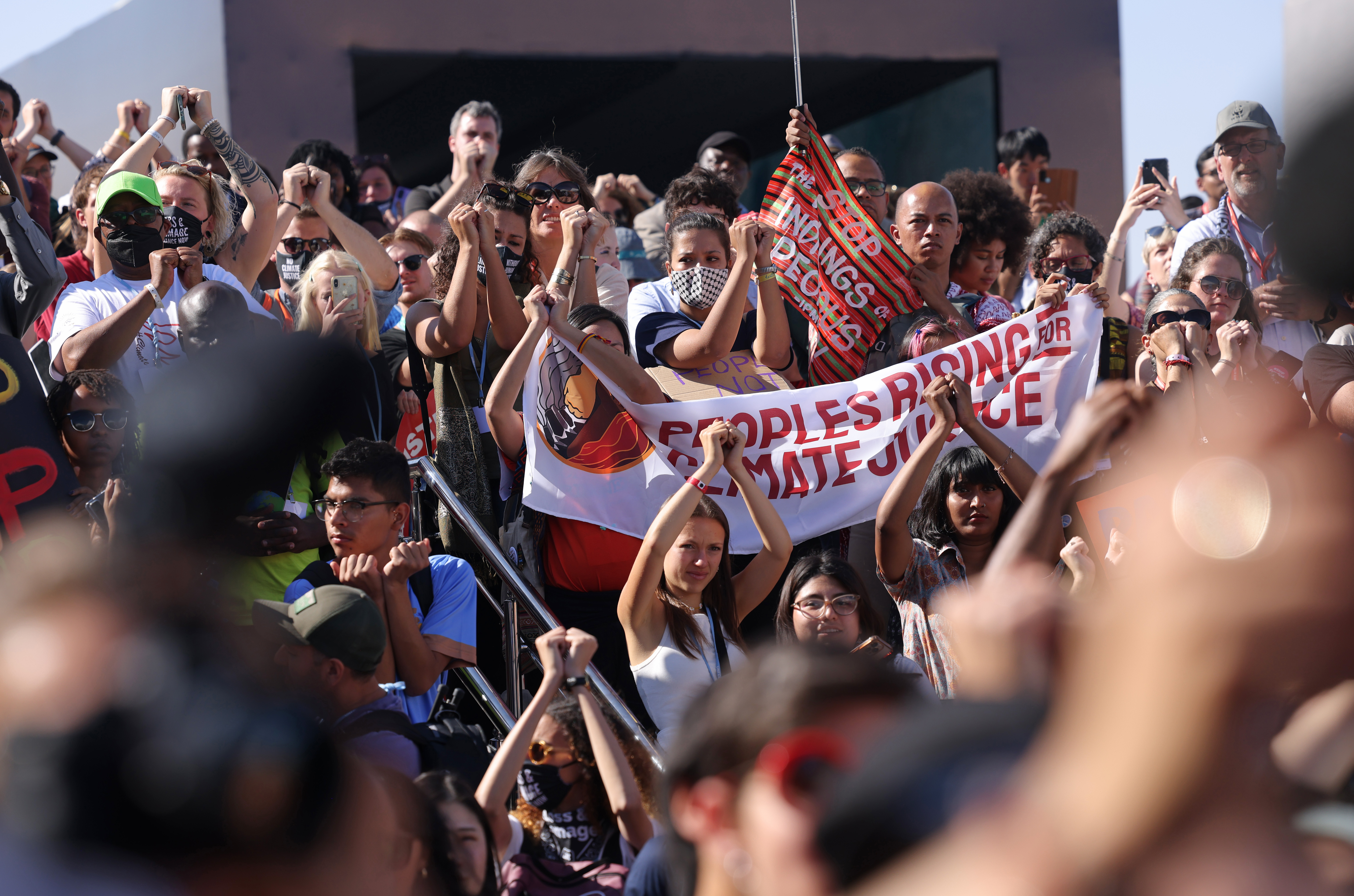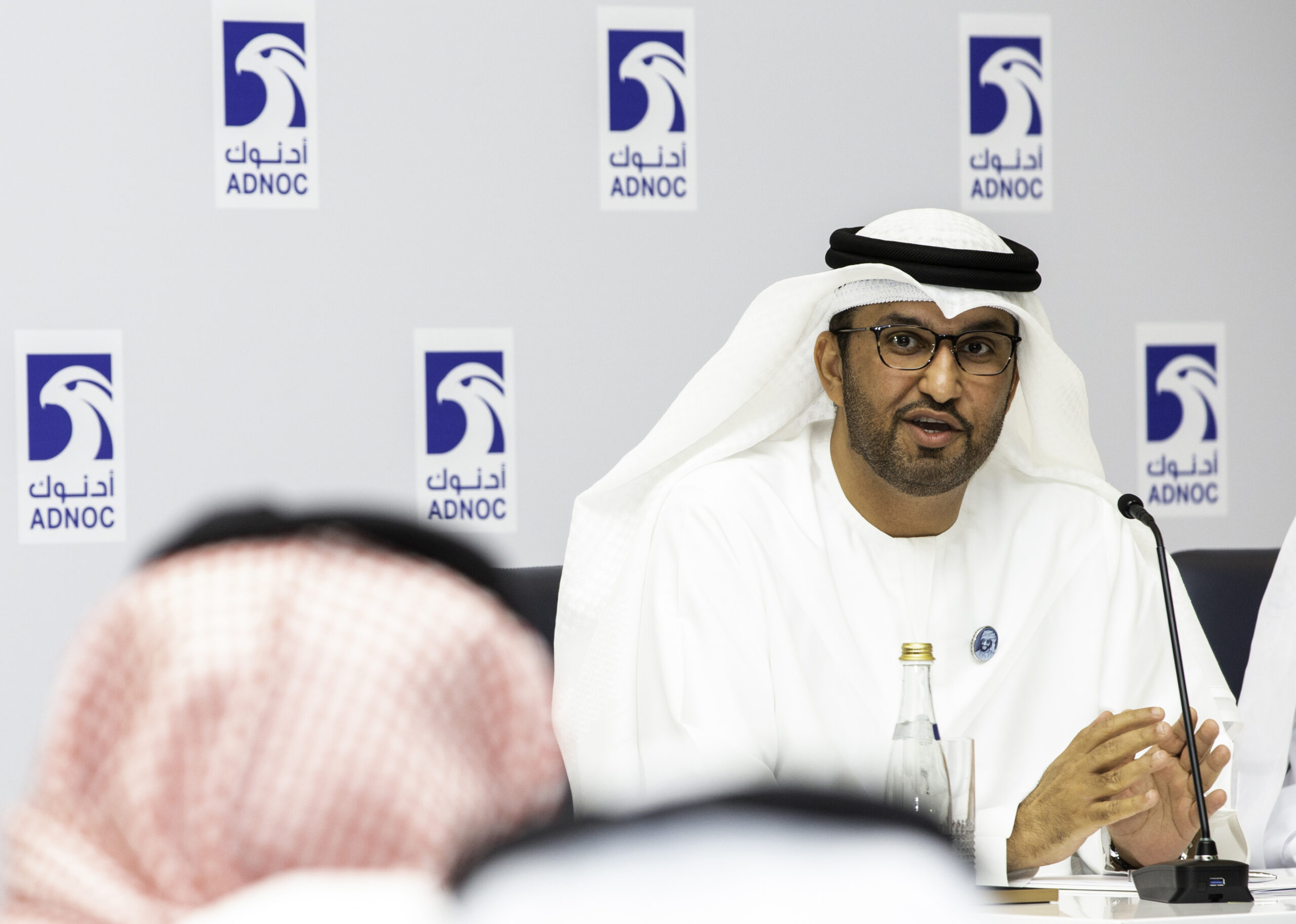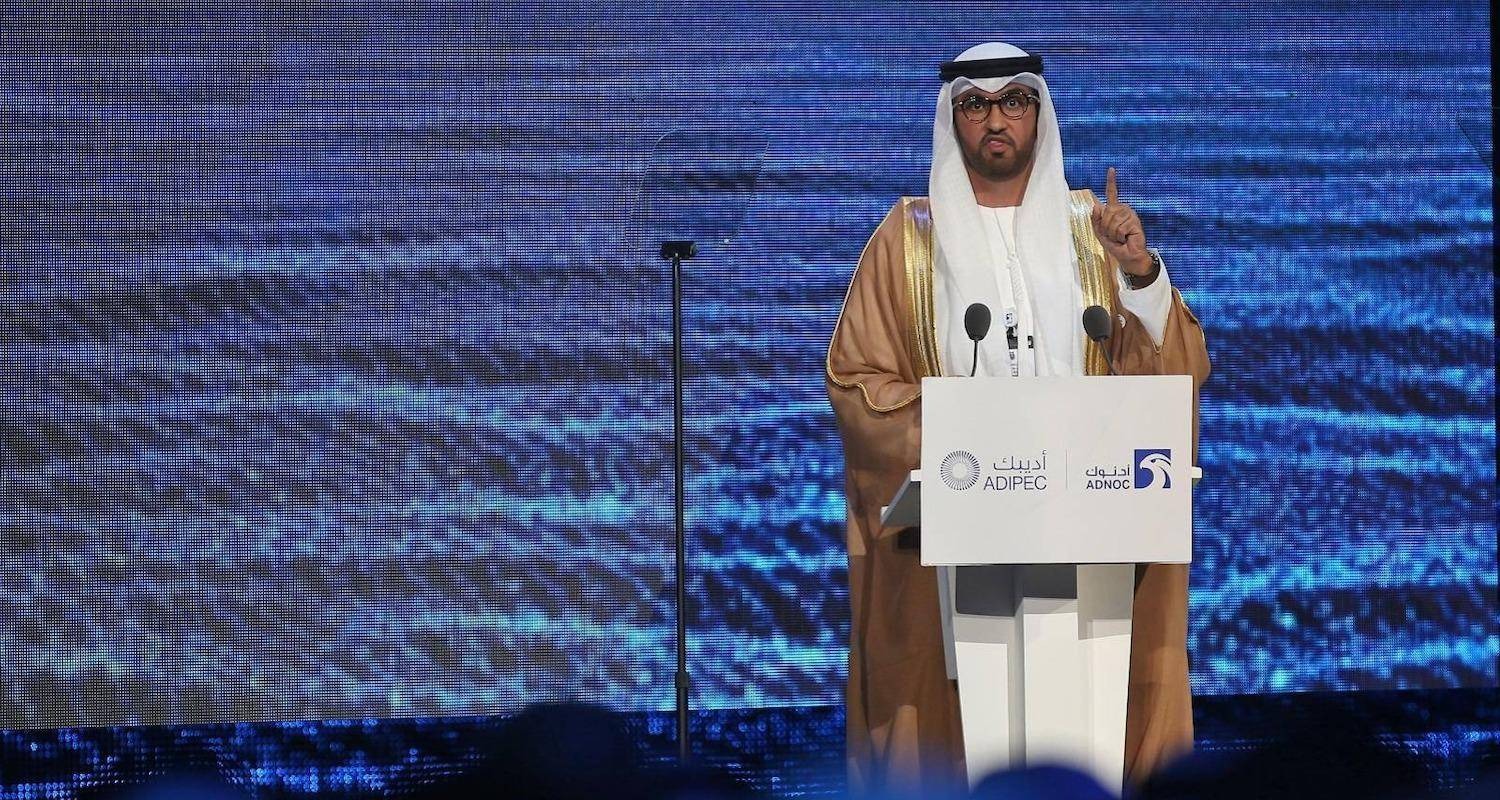
The UAE has tracked protest levels at previous climate talks according to a leaked recording obtained by CCR (Photo: Sean Gallup/Getty).
Leaked audio reveals UAE plans to “minimise” criticism of human rights abuses ahead of major UN climate summit
UAE’s Cop28 team warned senior government officials that human rights groups “will use this opportunity to attack the UAE” and discussed plans to “preserve” the country’s reputation.
September 1, 2023
With
The United Arab Emirates plans to “counter” and “minimise” criticism of the country’s human rights abuses at Cop28, the annual UN climate conference which will be hosted in Dubai later this year.
Leaked audio of an “exploratory meeting” between senior UAE officials and the country’s Cop28 team – obtained by the Centre for Climate Reporting and shared exclusively with the New York Times – offers a rare insight into how the government hopes to limit scrutiny at the summit. Among the revelations are plans to dodge questions on issues such as LGBTQ+ and labour rights, which in their view have no “connection to climate change”, to ensure Cop28 is not used as “free pass to throw everything at us.”
A US State Department report on human rights in the UAE published in 2021 found “credible reports” of a litany of abuses, including torture, interference with the freedom of peaceful assembly and laws criminalising same-sex sexual activity. But the country is hoping to use Cop28 to “enhance the reputation” of the nation, according to a list of “objectives” also leaked to CCR.
“It came up with Qatar with the World Cup”
The group discussed how to mitigate “reputational risks” during the meeting, which took place in February and included some of the government’s international law and human rights experts as well as the UAE’s former ambassador to the Hague, Abdullah Al Naqbi, and Cop28 CEO, Adnan Amin. Cop28’s head of communications, Sconaid McGeachin, warned at the meeting that the summits have become an “outlet for activism” and human rights advocates could use the fact it is being hosted by the UAE as a “platform to suit their agenda”.
“It came up with Qatar with the World Cup… they will use this opportunity to attack the UAE,” she said. “We need to preserve the reputation of the UAE. And to look at how we can protect that and enhance the reputation and to try and minimise those attacks as much as possible.”
Limiting scrutiny
Boosting the country’s reputation is a key part of the UAE’s “objectives” for the summit, according to the leaked document, which was prepared by the Cop28 president Sultan Al Jaber’s team at the Office of the Special Envoy for Climate Change. It states that the country hopes the major UN event can be used to “limit scrutiny and strengthen diplomatic prestige for the UAE”. But the leaked audio reveals concern among the Cop28 team about how criticism of the country’s human rights record could derail those plans.
McGeachin, who previously worked for the American PR firm Hill & Knowlton in Dubai and has been head of communications for Cop28 since last summer, cited a survey commissioned by the team last year which asked 20,000 people about the UAE hosting the summit. “The biggest concerns that came out were all associated with human rights,” she said, including freedom of speech, the right to protest and LGBTQ+ issues.
“It’s not everybody under the sun”
The team had prepared a list of “hostile questions” so that Al Jaber was able “answer some challenging questions”, McGeachin said. They were still “waiting for some of the answers on the human rights side,” which had to be signed off by other parts of the UAE government.
But one of the officials present at the meeting said “it’s not mandatory” to answer questions on issues such as LGBTQ+ rights. The official introduced herself as head of the Human Rights Office at the Presidential Court, an Emirati ministry led by President Mohammed bin Zayed Al Nahyan’s brother which, according to the UAE government website, provides support to the country’s “decision-makers”.
She stressed the need to differentiate “what is purely a human rights issue” from those associated with climate change, such as the right to food and water, and to specify what is meant by “vulnerable groups”.
“It’s not everybody under the sun,” the official said.
A spokesperson for the Cop28 team said: “The COP28 team has held – and continues to hold – meetings regarding its comprehensive preparations with key and relevant stakeholders to deliver transformative global climate action at COP28 UAE.”
An “inclusive Cop”?
The summit has been mired in controversy since Al Jaber’s appointment as Cop28 president in January. As well as serving as Climate Envoy, Al Jaber is head of the Abu Dhabi National Oil Company and is overseeing a major expansion of its oil and gas production. Climate activists have previously compared his appointment to putting a tobacco company in charge of an anti-smoking campaign.
The meeting, which happened several weeks after the announcement, sheds light on the mood inside the Cop28 team at the time. McGeachin said Al Jaber had been “personally attacked”. She also said “the UAE [had been] attacked in terms of an oil and gas man running [a climate summit] by some of the NGO community”. Since the time of the meeting, 130 US and EU lawmakers in May signed a letter calling for Al Jaber to be removed as Cop28 president.
According to the leaked list of objectives, the UAE also hopes the summit will help position Al Jaber as a “climate action leader” and “consensus enabler”. He has previously said he hopes to make Cop28 the “the most inclusive” Cop to date.
“We need to be seen to be engaging all stakeholders”
In the spirit of this “inclusive” approach, McGeachin suggested at the meeting that the Cop28 team could reach out to groups such as Human Rights Watch and Amnesty International, even though they have repeatedly highlighted abuses in the UAE.
“We’re aware that there are various reports coming out soon that we need to be ready for and joined up with all of you as to how do we counter those,” McGeachin said. “We’re saying we’re an inclusive Cop so we need to demonstrate that and we need to be seen to be engaging all stakeholders.”
“Even though that’s probably going to be challenging with some of the human rights groups,” she added, “[it] might be an advantage to at least show that we’ve held dialogues, we have met with them, and so on.”
But the official from the Presidential Court’s Human Rights Office warned against the idea. “When you’re thinking about engagement, now we have sort of started diving into the issues,” she said. Instead, conversations about human rights at Cop28 should be limited to those directly associated with climate change to ensure the summit is not used as a “free pass to throw everything at us”.
Freedom of expression
Joey Shea, a researcher at Human Rights Watch who investigates abuses in the UAE and Saudi Arabia, said it was “deeply concerning” that “they are only thinking about engagement with human rights organisations in the service of laundering their reputation”. CCR understands the Cop28 team has not reached out to Human Rights Watch or Amnesty International.
Critics have said the lack of freedom of expression in the authoritarian nation threatens to undermine the Cop process. Emiratis who express dissenting opinions against the government risk jail without the right to a fair trial or the right to appeal, according to human rights groups.
“We want them to respect freedom of expression”
Hamad Al Shamsi was one of the dozens of Emiratis who became known as the UAE94 after being arrested in 2012 for calling for democratic reforms. He described a “system” of abuse carried out by authorities against human rights defenders, including torture, months-long stretches in solitary confinement and interrogations that can last for as long as 24 hours. He said that Cops should be “based on freedom of speech” and called for the UAE to release its prisoners of conscience.
“You cannot be holding Cop28 in the UAE and not allowing any Emirati human rights defenders to participate,” said Al Shamsi, who lives in exile in Turkey and is not able to return to his home country.
A spokesperson for Cop28 said: “Cop28 UAE will take an inclusive approach that engages all stakeholders. This inclusiveness extends to every participant and visitor who will be able to assemble peacefully to have their voices heard in designated areas of COP28.”
One particular point of concern has been the ability of climate activists to safely protest at the summit. In May, scores of human and environmental rights groups released a statement which said the “severe restrictions” imposed by UAE authorities on the rights to freedom of expression and peaceful assembly will “hinder the full and meaningful participation of journalists, activists, human rights defenders, civil society, youth groups, and indigenous peoples’ representatives at Cop28.”
McGeachin said during the meeting the team had “tracked” protest levels at previous Cops, which she said were attracting “more noise”. Earlier this month, Al Jaber made assurances that climate activists would be allowed to protest at the summit. “There will be space available for climate activists to assemble peacefully and make their voices heard,” Al Jaber said in a joint statement with Simon Stiell, the head of the UNFCCC, the body which oversees the Cop summit.
But Shea questioned why it was limited to Cop28: “We don’t want them to respect the right to assembly during Cop28. We want them to respect and adhere to freedom of expression and assembly absolutely and in all circumstances and at all times.”
The UAE ministry of foreign affairs did not respond to a request for comment.
Related

